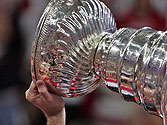|
About the Stanley Cup…
The history of the Cup began on March 18, 1892, at a dinner of the Ottawa Amateur Athletic Association. Lord Kilcoursie, a player on the Ottawa Rebels hockey club from Government House, delivered the following message on behalf of Lord Stanley, the Earl of Preston and Governor General of Canada:
 “I have for some time been thinking that it would be a good thing if there were a challenge cup which should be held from year to year by the champion hockey team in the Dominion (of Canada). “I have for some time been thinking that it would be a good thing if there were a challenge cup which should be held from year to year by the champion hockey team in the Dominion (of Canada).
“There does not appear to be any such outward sign of a championship at present, and considering the general interest which matches now elicit, and the importance of having the game played fairly and under rules generally recognized, I am willing to give a cup which shall be held from year to year by the winning team.”
Shortly thereafter, Lord Stanley purchased a silver cup measuring 7 ½ inches high by 11 ½ inches across for the sum of 10 guineas (approximately $50); appointed two Ottawa gentlemen, Sheriff John Sweetland and Philip D. Ross, as trustees of that cup; and set the following preliminary conditions to govern the annual competition:
- The winners to return the Cup in good order when required by the trustees in order that it may be handed over to any other team which may win it.
- Each winning team to have the club name and year engraved on a silver ring fitted on the Cup.
- The Cup to remain a challenge competition and not the property of any one team, even if won more than once.
- The trustees to maintain absolute authority in all situations or disputes over the winner of the Cup.
- A substitute trustee to be named in the event that one of the existing trustees drops out.
The first winner of the Stanley Cup was the Montreal Amateur Athletic Association (AAA) hockey club, champions of the Amateur Hockey Association of Canada for 1893. Ironically, Lord Stanley never witnessed a championship game nor attended a presentation of his trophy, having returned to his native England in the midst of the 1893 season. Nevertheless, the quest for his trophy has become one of the world’s most prestigious sporting competitions.
|